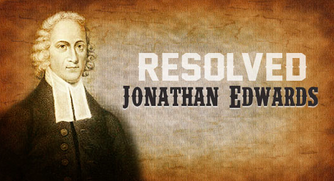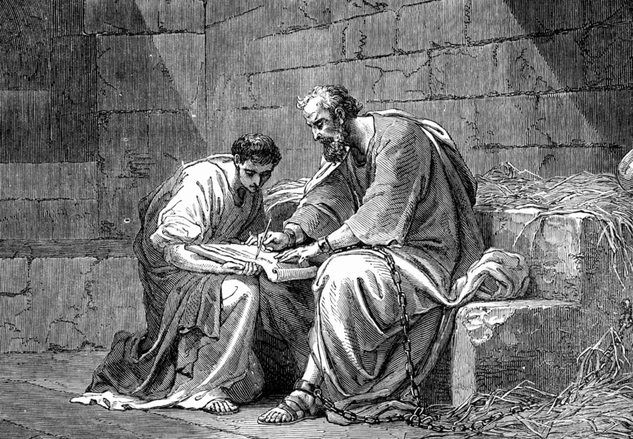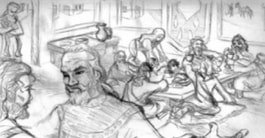My Ego, Not My Potential, Was Offended: A personal reflection on the mind of Christ (Philippians 2)2/20/2019 The following is adapted from my book Destroying Our Private Cities, a lay commentary on Paul's Letter to the Philippian church. I used an abbreviated form of this personal illustration during a recent sermon at Christ Presbyterian Church in The Hill, the church I am privileged to pastor in the Hill community of New Haven, Connecticut. The sermon was on Jesus eat with tax collectors and sinners (from Matthew 9); was used in a presentation on submitting to spiritual authority, the section on "Learning to Imitate Jesus." This illustration is the conclusion to my chapter on "Putting Jesus to Our Potential," an exposition on Philippians 2:5-11 A Menial Job Through my seminary years I worked part‑time to help support my family. My job consisted of the two things I despise more than anything on earth: cleaning and vacuuming. I was a janitor. Already I was a wreck emotionally. The combination of being a nobody at school and a janitor for a daycare center made things worse. I felt I was not fulfilling my potential. One day while cleaning a toilet I got angry at God. Slamming the sponge down into the toilet bowl, I said, “I am a preacher, a teacher. And here I am cleaning toilets!” I protested not getting the church position. I complained about not preaching. My insecurities matched my “unfulfilled potential.” I knew I was dealing with pride, but I thought my complaint was justified because I did have gifts, you know! In the midst of my tantrum, God brought to my mind a sermon illustration I had heard back at college. The preacher recalled the story of a rather well‑to‑do graduate student who finished top of his class with a doctorate. He felt called to the ministry, and a rather prestigious Philadelphia congregation invited him to be their pastor. But the young man felt called to work with William Booth in England. So he left America to apply for a ministry with the Salvation Army. At the interview, Mr. Booth told the young man there was no place for him. His education and wealthy-status would hinder him from taking orders from street preachers, some of them former drunks and prostitutes. But the young man was persistent, and Mr. Booth gave him a try. He sent him to a dark, dingy cellar to clean and shine the muddy boots of the street preachers. After a while, it occurred to the young man that indeed he might be wasting his talents and gifts. “You call yourself a servant of God,” the devil seemed to be saying, “but look at you. You’re squandering all you have to offer.” The man thought of the Philadelphia pulpit he had turned down. But as those thoughts danced in his head, another Voice whispered, “It’s all right. I washed their feet too.” My Ego, Not My Potential, Was OffendedThere at my daycare janitorial job, I realized the issue was pride and my false sense of fulfillment. It was my ego that had been offended, not my potential. Here in the United States we have, now, over 300 million “most important persons in the whole world.” Logic would suggest someone’s potential is going to be sacrificed. The mind of Christ turns this idea right‑side‑up. We must consider that the pursuit of our potential might actually be a disadvantage for others and a hindrance to the gospel. It is not self‑fulfillment but self‑submission that God desires. But you say, “If I give myself to sacrificial obedience, I could be put in a position where I was taken advantage of. I could be used and, even worse, abused.” That possibility exists. And it happens far too often. The solution is not to reject the biblical text and shrink from sacrificial service to others. The solution is to exercise the mind of Christ. Each of us has limited time, energy and resources. We should be selective. The Christ‑hymn of Philippians 2 supplies the appropriate elements for the decision‑making process.
0 Comments
In Philippians 2:13–16, Paul reveals the depth and breadth of the vital relationship between the church and our sanctification. He directs our attention, once more, to God’s purpose, his will. Paul reminds the Philippians, “for it is God who works in you to will and to act in order to fulfill his good purpose” (2:13).[1] This verse explains why we are to work toward mutual respect within the church body—why we are to pursue harmony and each other’s spiritual well‑being. Why are we to do this? “Because God is the One who is working both to promote his goodwill (his purpose) and to provide the ability to bring about such goodwill” (2:13, my interpretative paraphrase). This verse and Phil 2:12 blend God’s sovereign control and our responsibility. There is no contradiction here, for divine action always seeks to provoke a human response. God’s action should inspire our commitment both to support and to conform to such action. God’s Purpose: A Healthy Church What is this “purpose” that God seeks to work out? The word here is not normally translated “purpose,” but rather “pleasure” or “goodwill.”[2] Paul used the same word earlier (Phil 1:15) in describing the goodwill of those who supported his ministry. In this letter to the church at Philippi, it is not possible to shake the connotation this word would have had in the minds of the recipients. Although Paul is speaking about God’s purposes, his choice of this particular word would have indicated to the Philippians that God’s purpose is the well‑being—the health—of his church. Sense the flow of Phil 2:12–13 read together Along with your salvation, achieve mutual respect within the church. Why? Because God is the One who is producing among all of you the potential and the work that produces his good pleasure—that is, the church’s well‑being [author’s interpretative translation]. Most Christians at one time or another ask, “How can I find God’s will for my life?” Most of the “methods” suggested to help us find God’s will use a combination of Bible proof‑texts, feelings (or notions) and signs (or situations). I find it amazing that we who are fallible, prone to selfishness, and subject to sinful temptation (and, in our culture, inclined to comfort and self‑esteem) rely so heavily on the subjective. It is even more surprising when we consider that God has graciously revealed his will through the Bible and the Living Word, Jesus Christ. We need never feel that God’s will (his purpose) is somewhere far out there. Philippians 2:13 reveals once and for all until the end of time God’s will for us. We are to join him in achieving the church’s health, its well‑being.[3] Having confidence in God means we trust him to bring about what he promised. Jesus himself said, “I will build my church, and the gates of Hades will not overcome it” (Matthew 16:18). Despite the condition of the church and the varied levels of health from church to church, God will work effectually to build his universal church. He will bless and strengthen any endeavor or personal attitude that builds, renews, or enhances the vitality of his church. How do we show God’s good pleasure? Next, in Phil 2:14–15, we have an imperative with a promise: “Do everything without complaining or arguing, so that you may become blameless and pure, children of God without fault . . .” Imperatives are to be obeyed. But they also are indicative of something. In this case, 2:14–15 describes God’s people. No More Complaining! No More Arguments! In order to promote goodwill within the congregation and thus restore the church’s health, the Christian community is to refrain from “complaining” (literally, grumbling) or “arguing” (literally, disputing). This reference to grumbling (complaining) and disputing (arguing) evokes images of the nation Israel as it journeyed through the Sinai desert. The people complained against Moses and doubted God’s promises (Exod 15‑17; Numbers 14‑17; 1 Cor 10:10). Whether Paul intends to make a direct parallel or not, one thing is certain. Such attitudes led the people to stray away from God and act immorally. Such attitudes caused Israel’s enemies to blaspheme Yahweh God. Paul says “God was not pleased with most of them” (1 Cor 10:5).[4] If Israel’s grumbling in the Sinai desert displeased God, the grumbling of the Philippians also was contrary to God’s good pleasure. Such an attitude still is!
Paul’s reference in 2:15 to “children of God” implies a family resemblance. We bear God’s likeness. That is why we are to be above blame, pure and without fault. Not that we will be free from false accusations or even from deserved blame. But, certainly we are not to bring such accusations on ourselves because of sinful, unrighteous, or worldly behavior (1 Pet 2:11–17; 2 Cor 6:1–10). The testimony of God resides in the church. We bear God’s image. Our “love for one another” and our participation in the gospel (that is, our love for those outside the church) is communication loud and clear. Where is the church to be the church? Jesus said to his Father, “My prayer is not that you take them out of the world but that you protect them from the evil one. They are not of the world, even as I am not of it” (John 17:15–16). In a similar way, Paul exhorts the Philippian church. On the one hand, they are not to be “complaining or arguing” (that is, not of the world). On the other hand, they are to be the church, above reproach, amid “a warped and depraved generation” (that is, in the world). More Old Testament Examples Paul continues to draw upon images from Israel’s exodus from Egypt. The reference to “a crooked and depraved generation” is an allusion to Deut 32:5:
Moses was saying that those Israelites who rebelled against God and were unrepentant of their “grumbling” were in fact not God’s people at all. In quoting Moses, Paul certainly had in mind the false apostles who were belittling his ministry and causing havoc within the Philippian congregation (Phil 1:15–17). Those were not God’s people. Yet despite their contentiousness, the true congregation (3:3) must be faithful followers of Christ Jesus. They are God’s people, who look “. . . to the interests of the others” (2:4) and demonstrate Christ-like obedience (2:8). Paul most assuredly also had the pagan, Gentile world in view. The church must remain the church in the midst of a perverse society that has refused or twisted the truth of God (Acts 13:10; 20:30).
But how can the church witness to God’s truth if it is more concerned about its pride, its self‑interests, and its status? Restoring the church—bringing health to the church—means restoring its witness. So the church, which is the light, is to display its sacrificial and redemptive obedience, its good works of harmony, selflessness and humble service to others. Then it will be an influence for good in a corrupt and darkened world (Matt 5:14; Eph 5:8; 1 Thess 5:5).[6] There should be no doubt that Paul is also warning the congregation. The author to the Hebrews asks: “. . . how shall we escape if we ignore such a great salvation?” (Heb 2:3). Paul’s language in Philippians reminds us of the dangers of disobedience. We are to remember that the church and the gospel are at stake. When we do not seek the church’s health, we cannot expect that we will display God’s truth in a darkened, perverse world. Consequently, we compromise our very purpose in the world. [1] The words in you should be understood to mean “among you” (i.e., among you, the Philippian congregation). The you is plural and should be understood corporately rather than individually as if addressed personally: “It is God who works among you [the church in Philippi] to will and to act according to his good purpose” (author’s translation, 2:13). [2] A syntactical‑linguistic study of the phrase hyper tēs eudokias (lit., according to pleasure, 2:13) indicates that Paul intended a semantic relationship between God’s purpose and the church’s well‑being. It is variously translated “for his good pleasure” (NASB, KJV), “according to his good purpose” (NIV), “to obey his good pleasure” (Good News). In Rom 10:1, Paul uses the word eudokia (pleasure, purpose) to indicate his “desire” to reach the Jews. In 2 Thess 1:11, it points toward the fulfilling of “all [their] pleasure” or “good purposes.” In Eph 1:5, it is a synonym for God’s will. In the Philippians passage, there is no doubt that God’s “purpose” is meant, but Paul uses the term to develop as well the connotation of the church’s “goodwill.” Hawthorne translates 2:13, “For the one who effectively works among you creating both the desire and drive to promote goodwill is God” (101). The preposition hyper rarely means “according to” (NIV) or “for” (NASB). Where the only subject is a prepositional phrase, as in 2:13, it is used to indicate that which a person (in this case, God) wants to attain. The context is clear. The exhortation is a call to harmony, unity, and goodwill toward others. See Martin’s comment on this text in Philippians (New Century Bible Commentary, 1980). Martin correctly translates 2:13, “[It is God who] produces the will to amend the condition of his people and brings about the accomplishment of this state of ‘goodwill’.” [3] Throughout the New Testament this same thought is understood as building the church, increasing the church, or the gospel, serving the saints, etc. [4] The verb form of eudokia (pleasure, purpose) in Phil 2:13 is used in 1 Cor 10:5, making the contexts similar. [5] Hawthorne, 101. [6] Ibid., 103.
We do not lack for sermons and books on the topic of discipleship. Some Christians speak about discipleship as if it is something to be into—like being into politics or into running or into body building or into gaming. But such a view of discipleship betrays some faulty assumptions. First, we tend to formulate the call to discipleship as an option for Christians to consider. Second, there is a tendency (especially in today’s consumer oriented churches) to make discipleship attractive (with a book you can buy or a study-guide to purchase). The fact is, there is nothing attractive about discipleship. It calls for an undivided loyalty to the gospel, full allegiance to Jesus, the Messiah. It calls people to place themselves at the disposal of Jesus and the work of his church. Dietrich Bonhoeffer said it best: “When Christ calls a man, he bids him come and die.” As Paul puts it in his letter to the Philippians, both Timothy and Epaphroditus are examples of discipleship. They, indeed, exemplify what J.B. Phillips remarked about the early Church: "Perhaps because of their very simplicity, perhaps because of the readiness to believe, to obey, to give, to suffer and if need be to die, the Spirit of God found what He must always be seeking—a fellowship of men and women so united in faith and love that He can work in them and through them with the minimum of . . . hindrance. Paul, in referring to Timothy and Epaphroditus, is they are examples of a committed Christian life—they are examples of the Christian life of discipleship. The Christian life is a call to discipleship, a call to authentic Christian living. Whereas sanctification is the process (and progress) of becoming more like Christ, discipleship is the discipline, the lifestyle of the one who is becoming more like Christ. As one reads through a text like Philippians 2:19–30, we discover the marks of the true disciple of Jesus Christ. Paul certainly is informing his friends back in Philippi about his situation. But in doing so he uses special words to describe Timothy and Epaphroditus. He wants the Christians of the Philippian church to know these two men are models of the Christ hymn Paul earlier cited (2:5–7): "Have this mind among yourselves, which is yours in Christ Jesus, who, though he was in the form of God, did not count equality with God a thing to be grasped, but emptied himself, by taking the form of a servant . . ." We should resolve to be the servants, bond slaves actually, that characterize Jesus; servants that lives the gospel as models of Jesus. As Christ followers, we shine as lights in a dark world. Timothy and Epaphroditus model this for us. Paul shows us the way (2:12–18). "Therefore, my beloved, as you have always obeyed, so now, not only as in my presence but much more in my absence, work out your own salvation with fear and trembling, for it is God who works in you, both to will and to work for his good pleasure. Do all things without grumbling or disputing, that you may be blameless and innocent, children of God without blemish in the midst of a crooked and twisted generation, among whom you shine as lights in the world, holding fast to the word of life, so that in the day of Christ I may be proud that I did not run in vain or labor in vain. Even if I am to be poured out as a drink offering upon the sacrificial offering of your faith, I am glad and rejoice with you all. Likewise you also should be glad and rejoice with me."
When Jesus called his disciples to “follow me and I will make you become fishers of men” (Mark 1:17), most assume a positive evangelistic outcome of reaching people for Christ. Nothing could be further from the reality behind Jesus’ intentions in calling out followers to be such witnessing-fishers. At least the benign, banal application of making this verse a proof-text for “witnessing” is a shallow and narrow application of Jesus’ powerful imagery cast in this tremendous text.
Tax collectors are outsiders; rich they might have been, but they were in the eyes of temple leadership, traitors to God and to God’s people. Yet, the sinners are most certainly the uneducated serfs and peasants, farmers, and those who lived on the margins of life in and around Jesus’ house in Capernaum of Galilee (2:15). One cannot spin from this text a general characteristic that “sinners” are all sinners anywhere you find them. As are the "tax collectors," they are a specific demographic associated with those living as the poor and marginal of Jesus’ day. Jesus’ response, then, takes on an ominous shadow—a fisher shadow, standing on the shore, cast into the waters of those that are "healthy." True fisher-followers of Jesus will not rationalize their standing in the community nor their affluence, but will count their privilege, their advantage, at the disposal of the “sick” who need a physician. Paul is not far from the same imagery when he describes how Jesus took his advantage (his privilege) and gave it all on behalf of all those with the greatest of disadvantage. Have this attitude in yourselves which was also in Christ Jesus, who, although He existed in the form of God, did not regard equality with God a thing to be grasped, but emptied Himself, taking the form of a bond-servant, and being made in the likeness of men. Being found in appearance as a man, He humbled Himself by becoming obedient to the point of death, even death on a cross (Phil 2:5-8). Most likely Amos 4:1-2 is one of the underpinning Old Testament referents that would have given the disciples a frame, a rather menacing edge, for understanding the potency of Jesus’ call on their lives. In view of the inclusion (contextually) of Amos 4:1, namely the “cows of Bashan” referent, I have become wary of the poorly distributed resources, talents, and wealth among the richer, more affluent churches at the expense of the poorer churches, neighborhoods, and urban mission fields. By “expense” I am thinking biblically, not culturally, socially or (heaven forbid) politically, nor through the lens of class, but by the very New Testament discipleship implications, namely that those with advantages (“privilege,” if I may) who are called by their association with Jesus to help those who are at a disadvantage. The assumption that it takes more money to reach the rich and affluent than the poor is turned on its head by the very presence of the Kingdom (cf. Mark 1:17 with Mark 1:14-15). A more gospel-centered and mature view of discipleship seem to argue that it takes far more resources to go into the poor urban fields to bring forth a harvest for the gospel of the kingdom. These are under-resourced communities in every imaginable aspect of life. As affluent Christians, we tend to justify our station in life as a combination of gift and hard work and hear any talk of “privilege” as a justification of those of lesser means, with poorer gifts, and perhaps, with what we perceive, a lesser work ethic to grab what we have for themselves. Is there no wonder the affluent in the days of both Amos and Jesus attempted to rid themselves of the troublemakers who upset the "healthy's" status quo? This will be the lot of fisher-follows of Jesus in any culture. Following Jesus, as the gospel is imagined by Mark (and the other Gospel writers), put us at odds with everything we hold dear, in particular those who have the advantage in resources are to empty themselves on behalf of those who are at a disadvantage (cf. Phil 2). The fisher-follower mission is toward the sick (of our society), not the healthy (in our society)—toward the disadvantaged and not the advantaged. Michael Card prophetically reflects this Marken view of Jesus and the gospel in the words of his song, The Stranger:
For a youtube of Michael Card's "The Stranger" >> Click here *See chapter 3, “‘You Will Appear as Fishers’ (Mark 1:17): Disciples as Agents of Judgment,” in my Wasted Evangelism for a further and more detailed study of the Mark 1:17 “fishers of men” passage.
We do not lack for sermons and books on the topic of discipleship. Some Christians speak about discipleship as if it is something to be into—like being into politics or running or weight loss. But such a view of discipleship betrays some faulty assumptions. First, we tend to formulate the call to discipleship as an option for Christians to consider. And second, there is a tendency (especially in today’s consumer oriented churches) to make discipleship attractive. The fact is, there is nothing attractive about discipleship. It calls for an undivided loyalty to the gospel. It calls people to place themselves at the disposal of the Church and Christ's work through it. Dietrich Bonhoeffer said it best: “When Christ calls a man, he bids him come and die.” Both Timothy and Epaphroditus exemplify what J.B. Phillips remarked about the early Church: Perhaps because of their very simplicity, perhaps because of the readiness to believe, to obey, to give, to suffer and if need be to die, the Spirit of God found what He must always be seeking—a fellowship of men and women so united in faith and love that He can work in them and through them with the minimum of… hindrance. What Paul implies in his descriptions of these two men indicates what the true Christian life is. The deeper Christian life is a call to discipleship, a call to authentic Christian living. Whereas sanctification is the process (and progress) of becoming more like Christ, discipleship is the discipline, the lifestyle of the one who is becoming more like Christ. Making one's way through 2:19-30, we discover the marks of the true disciple of Jesus Christ. Paul certainly is informing his friends and church plant back in Philippi about his situation. But in doing so, he uses special words to describe Timothy and Epaphroditus. He wants the Philippians to know these two men are models of the Christ hymn Paul earlier cited (2:6 11). The narrative implies instruction. We should resolve to give the God's church, the local church, and the gospel priority (2:1 4, 12 18).  Biographies, autobiographies, and the diaries of great Christian men and women fascinate me. Giants such as John Wesley, George Whitefield, David Brainerd and Jonathan Edwards captivate me. I am convicted, motivated, and humbled by the accounts of those whom God has greatly used to promote His cause and increase His kingdom. In eternity I am sure we will learn of countless others unmentioned in the history books and unnoticed by the general public. Jonathan Edwards, born in 1703, enrolled at Yale at age thirteen. (Thirteen, people!) He was a key instrument through whom God brought a great spiritual awakening to early colonies that had become careless about the faith of their forefathers. His influence was felt in much of New England, New York and New Jersey. Eventually Edwards was asked to become president of Princeton College, a school then devoted to training church leaders. The life of this incredible man of God ended one month after he arrived at his new post. Ah, but what a life! Jonathan Edwards has been the subject of many biographies. All seek to discover what motivated him, what drove him, what fed his passion. For answers, we must return to Yale College and note the aspirations of this young student. Edwards was convinced he must make some resolutions in the presence of his God. The list numbered 70 items, all of which he committed to memory. I am particularly interested in "Resolve 6," which certainly summarizes the passion of Edwards’ heart: “Resolved to live with all my might while I yet live.” In pondering that resolution we must keep two things in context. First, life to young Edwards was a gracious gift from God. Second, all of his resolves were made in the consciousness that God was looking on. His first resolution, in fact, was to “do whatsoever I think to be most to the glory of God.” Since God’s honor and glory were at stake in his life, Edwards further resolved “to find out fit objects of liberty and charity.” Further, he would “live so as I shall wish I had done when I come to die.” This is a reflection of biblical discipleship, most rare in today's modern, consumer-oreiented church. This is a short excerpt from my book, Destroying Our Private Cities, Building Our Spiritual Life, a lay commentary on Paul’s letter to the Philippians. Here’s a sample chapter, “Putting Jesus Back into Our Potential.” Of course you can click through to Amazon to purchase the book, too!
|
AuthorChip M. Anderson, advocate for biblical social action; pastor of an urban church plant in the Hill neighborhood of New Haven, CT; husband, father, author, former Greek & NT professor; and, 19 years involved with social action. Archives
February 2024
Categories
All
|
Pages |
More Pages |
|




 RSS Feed
RSS Feed